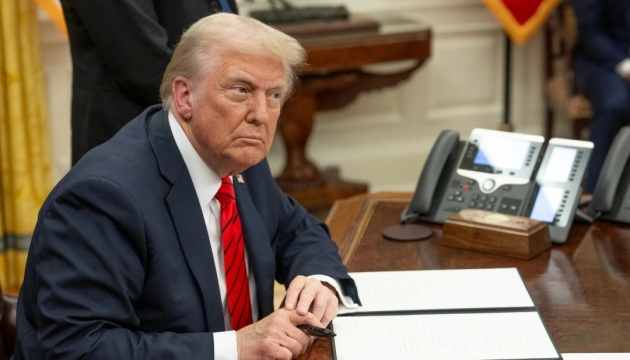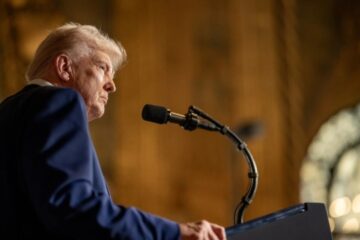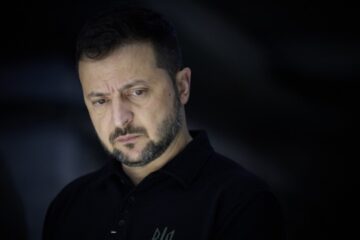
Donald Trump, like other leaders of countries deemed “unfriendly” to Russia, is a frequent target of ridicule on leading Russian state propaganda media.
This was reported in a press release by the analytical project War of Words, obtained by NV and relayed by Ukrinform.
Analysts note that this practice is systemic for Russian propagandists, and they consistently apply it to Western politicians, including Joe Biden, Emmanuel Macron, Boris Johnson, Angela Merkel, and others.
“Even those who at some point tried to engage in dialogue with the Kremlin eventually faced humiliating coverage in the Russian information space. Currently, Russian federal television uses rather harsh, contemptuous, mocking, and sarcastic rhetoric toward the sitting U.S. President,” the press release states.
To determine how frequently such messaging appears on key Russian TV channels, War of Words analysts used an AI-based system, which identified 14,000 mentions of the word “Trump” between February 18 and April 4, 2025.
“One in seven mentions of Trump contains sarcasm, mockery, or contempt. Over a month and a half, this happened 2,009 times — an average of 43 times a day, Russian propaganda uses Trump’s name or related events to portray him to Russian audiences as a ‘dunce in world politics,’ ‘a rude, tramway-level boor,’ ‘a bull in a china shop,’ ‘someone who shouldn’t be in the White House but in a madhouse,’ ‘a traitor to Russia — Trumpushka is no Cossack,’ ‘a politician of the new wave — a lawless developer, a populist,’ and so on,” the release states.
The mocking is most prevalent on Russia’s main federal TV channels: Rossiya-1, Channel One (Pervy Kanal), Zvezda, and NTV, according to the researchers.
Programs where Trump is most frequently mocked include: Time Will Tell (Channel One), Evening with Vladimir Solovyov (Rossiya-1), Open Air. Talk Show (Zvezda), 60 Minutes (Rossiya-1), The Great Game (Channel One).
According to the research, Russian TV mocks Trump using language and tone familiar and appealing to Russian viewers, including personal insults (“lies,” “doesn’t blush,” “ginger”), exaggerations (“new ideas every day,” “pretending to be Putin,” “failed businessman”), dehumanization (“unhinged,” “doesn’t understand what he’s doing,” “looks worse than his shirt,” “typical American — knows nothing about anything,” “flip-flopper”), and contrast (“Our leaders are calm and businesslike, while over there they’re running around with golf clubs”).
Also, according to the researchers, Russian TV channels, when mentioning Trump:
- distort cause-and-effect relationships – for example: Trump’s trade war = Great Depression;
- lean on cultural archetypes – such as “Russia is a fortress” vs. “the West is chaos”;
- portray U.S. hesitation in standing up to a strong Russia (e.g., claiming Trump is depicted in the UK as a “fool” incapable of tough negotiations with Putin);
- claim that Putin sees Trump as “easy prey”;
- invoke cultural codes familiar to Russian viewers to reinforce a sense of “we’re the smart ones” or “we’re in this together”.
The War of Words analysts believe that the overall goal of Russian propaganda regarding Donald Trump is to portray the U.S. President as weak, unprepared, and vulnerable in negotiations. At the same time, propagandists claim Putin is in control, using Trump for his own benefit, while Western partners view negotiations as risky due to Trump’s inability to make strategic decisions.
The press release states that Russia is trying to position itself as the only ‘mature’ party in negotiations and is psychologically preparing its audience to believe that an American defeat is inevitable.
“Russia’s comprehensive rhetorical strategy is to quickly embed a simple worldview in its citizens’ minds: ‘our people are strong,’ ‘others are clowns or victims.’ The propaganda deliberately employs negative emotional language, ridicule, and dehumanization to foster a biased attitude toward opponents — among them the U.S. President — and to evoke revulsion toward alternative viewpoints.
This isn’t just an information attack, it’s a psychological operation designed to create the impression of Russia’s inevitable victory even before any real decisions are made. In this way, a parallel reality is shaped in which any resistance appears either senseless or doomed,” said Volodymyr Borodianskyi, founder of the War of Words propaganda research service and former Minister of Culture, Youth and Sports of Ukraine.
Photo: White House



